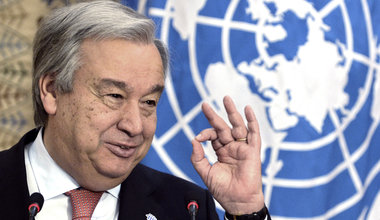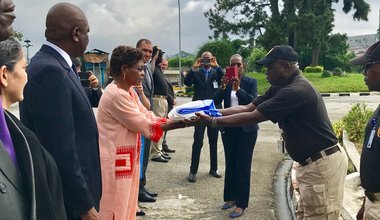PRESS REVIEW FOR THURSDAY, 3 JUNE 2010
Collaboration UN – AU:
Launching ceremony for six QIPS financed by the African Union
Le Jour Plus–
A ceremony to
launch six Quick Impact Projects (QIPs) financed by the African Union (AU)
Commission through the UNDP's basket fund for a total amount of $100,000, took
place on Wednesday, 2 June 2010 at the headquarters of the African Union's
liaison office in Abidjan. The projects will be implemented by the Civil Affairs
Section of the United Nations Operation in Côte d'Ivoire (UNOCI). It consisted
of the rehabilitation of a public primary school in Commikro 3 in Dimbokro
district, the purchase and installation of two mills for women associations in
Korhogo and the rehabilitation and equipping of a public primary school in Gbon
1 in Kouto district, near Boundiali. The other projects are the installation of
three hydraulic pumps in Grégbeu, in Zoukougbeu district near Daloa, the
rehabilitation of the market in Kontrou, in Kouibly district, in the west of the
country and the construction of a gazebo in Lycée Mamie Houphouët Fetai in
Bingerville. The Special Representative of the Chairman of the African Union
Commission, Ambroise Nyomsaba, said that the reason for the Commission's support
is that "the AU is already in the prospect of the post-crisis period,
consolidation of peace and reconstruction".
Ban Ki-Moon to the Forces
Nouvelles: "That is enough! Regroup your elements in cantonment sites as soon as
possible!"
Le Temps–
In the 24th
report by the UN Secretary-General on the United Nations Operation in Côte
d'Ivoire (UNOCI), Ban Ki-Moon announced, by resolution 1911 (2010), that the
Security Council prolonged UNOCI's mandate until 31 May 2010 and says he will
re-examine the UN mission in Côte d'Ivoire. In the same report, the UN Chief
made observations and gave recommendations to the political and military actors
of Côte d'Ivoire. (...) The events which occurred in Côte d'Ivoire until late 2009
gave hope that the country had finally decided to end the long crisis. The
Ouagadougou Political Agreement established a permanent consultative framework
in order to make significant achievements – more than any other previous
agreement. (...) I was therefore disappointed by the overnight stop in the
electoral process in January 2010 and the violence that occurred in February
which constituted a serious step backwards in the Ivorian peace process. (...) I
note with satisfaction that the Prime Minister assured the technical assessment
mission that the issue of disarmament and reunification before elections were
not a problem. Consequently I urge the Forces Nouvelles to keep their promise
and regroup the forces in Korhogo and then in other cantonment sites as soon as
possible. The measure should be coordinated with the demobilization and
reintegration of ex-combatants. UNOCI is helping the government to plan and
coordinate the current broken process. (...)
Ivorian crisis: Blaise
Compaoré threatens to stop the mediation
L'Expression–
The Burkinabè Head of State, Blaise Compaoré, yesterday, warned in an interview
transmitted on the TV channel France 24, that he would stop the mediation in the
Ivorian crisis in 2010. "It is certain that my limits can effectively stop
during this year", Mr. Compaoré responded to a question on the possible end of
his mediation "if on a given date" the crisis is not resolved. After 2010, "I
will deal with it but not at this level", he added. The President of Burkina
Faso is the "facilitator" of the Peace Agreements signed in 2007 in Ouagadougou
to put an end to the armed crisis which started on 19 September 2002, and
created the division of Côte d'Ivoire between north under the ex-rebels' control
and the south under the loyalists' influence. In spite of the successive
agreements, Côte d'Ivoire is still in the search for presidential election
always postponed since the term of the Head of State, Laurent Gbagbo ended, in
2005. "I think we can hope that soon the date (for election) will be decided",
said the facilitator. "The electoral commission and the government will quickly
agree on the production of an (electoral) list which will be accepted by
everyone", he said. "There is work for the reunification of "the country" which
has started", he also welcomed, saying that he does not believe that
"difficulties" can make the country return to "the starting point", that is to
say, to war. While the electoral process, which was blocked since the beginning
of the year, restarted heavily mid-May, the argument on the processing of the
voters' list is still a topical issue in the Ivorian political class. (...)
After a working session with
the head of state: Prime Minister Guillaume Soro, yesterday -"Let's wait until
Friday for more details"
Le Nouveau Réveil–
As part of the
crisis-resolution process, the Prime Minister Guillaume Soro, held a working
session yesterday with the head of state, Laurent Gbagbo at the presidential
palace in Abidjan-Plateau. Below is the statement he made to journalists at the
end of the meeting:
"Ladies
and gentlemen of the press as you are no doubt aware the head of state has
initiated a dialogue by visiting Messrs Bédié and Ouattara.
Today, he invited us for a working session, during the course of
which, we spoke of course about the holding of the presidential election. What I
can tell you is that the head of state who wants the election to be held wanted
an update on preparations for the said election. This led us to talk about the
provisional electoral list. I repeat the provisional electoral list. As you know
for some time now there has been a debate on irregularities that have been
noticed on the provisional list. So it was an issue that we discussed to see how
we can find a solution which will not only reassure the candidates but also all
the political actors, of the reliability and clarity of the provisional
electoral list. So the discussions focused on this issue. I should also stress
that we all noted the urgency of resolving this issue in order to produce a
definitive electoral list and do everything possible to organize the election as
soon as possible. So this is how the discussions went today. The institutions
concerned were asked to work as quickly as possible to propose a date for the
elections. The President suspended the meeting so that we can meet again on
Friday, 4 June 2010, to finalise what we discussed today and the proposals that
were made. So, on Friday a 4pm, we are meeting here and hope to come to a
definite conclusion.
(...)
"Tagro, OPA has
failed, resign ! "
Le Nouveau Réveil -
Professor
Koulibaly Mamadou, the president of the National Assembly and deputy chairman of
the FPI, a mainstay of the part has hit hard at Laurent Gbagbo's regime. During
a conference described as a discussion on « an evaluation and perspective of
democracy in Côte d'Ivoire, 20 years after multipartism ", he sharply criticised
Désiré Tagro, who, according to hi mis the source of the unhappiness in the
country and the difficulties in the implementation of the OPA.
Read the integral
parts of his presentation.
(...)
The failure of Africa is in its political class and those of the
pharaons of Egypt up to the governments of today.... A charateristic example of
this type of failure is the Ouagadougou Political Agreement known as OPA.
Initially scheduled to be implemented within six months and presented as the key
to solving the Ivorian crisis, OPA, after three years of negotiations is alas a
succession of deadlocks, bitterness, doubt and inertia. According to member of
parliament, William Ateby, the crisis-resolution process, evaluated six months
ago, excluding the cost of the armies, would have cost some 600 billion FCFA
without yielding any positive results. Except for some symbolic destruction of
weapons and the theoretical disappearance of the zone of confidence, the rest
of the agreement ended in complete failure. The identification of the population
which led Côte d'Ivoire to civil war has still not been achieved, three years
after we still not have an electoral list and yet Minister Tagro Désiré is still
insisting that everything is fine and that the modus operandi adopted are going
to lead us to peace. (...)
Apart from the appeals on the
electoral list, we must assume our responsibility and audaciously pronounce the
disappearance without condition of the rebel force who should go back to what
they did before the rebellion or if we must respect our commitment made in OPA,
should be integrated into the army, the gendarmerie and the administration.......
We should then hold elections after modifying the constitution to conform with
the Pretoria Agreement and the illegal prescriptions that Désiré Tagro has made
the President take. (...)
 ONU
ONU Nations Unies Maintien de la paix
Nations Unies Maintien de la paix



